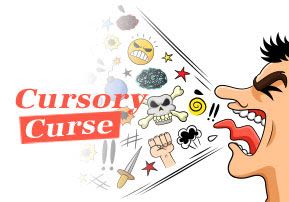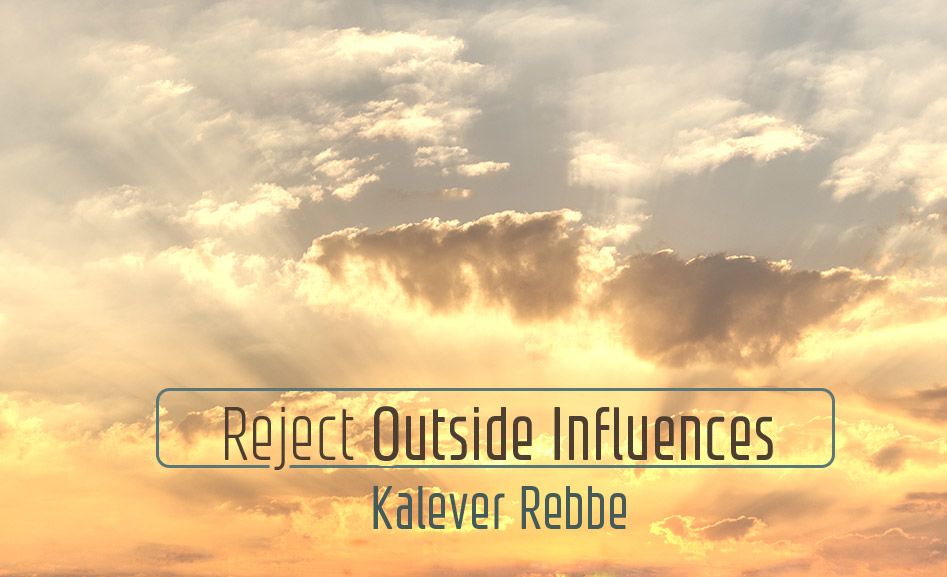
Cursory Curse
One must be very careful to avoid causing pain or sorrow to other people and never ever drive them to the point where they lose control and curse…

Our sages in Tractate Megilla say, “Don’t take a simple person’s curses lightly.” Even the curse of a simple, seemingly insignificant individual is serious. A justified curse is a lot different from a curse that someone utters in a fit of rage. Where there is no justification for the curse, or where someone who curses incessantly has uttered it, then the curse is sure to boomerang and fly right back at the person who said it.
King Solomon said in Chapter 26 of Proverbs that the unwarranted curse will not reach its target. Our sages learn that it will not only fail to reach its target, but it will rebound back to the person who said it, yet only if unwarranted. However, in the event that a curse brought so much anguish to an individual that he or she cursed back – especially when they were not accustomed to cursing anyone, then that retaliatory curse is liable to be very harmful. That’s what our sages meant when they said, “Don’t take a simple person’s curses lightly.” One must find a way to placate that person right away.
One must therefore be very careful to avoid causing pain or sorrow to other people and never ever drive them to the point where they lose control and curse. Taking a normal person and pushing him to the limits where he responds with a curse constitutes a violation of all boundaries of decency. This is because the person who cursed in the first place, triggering the other person to curse, invoked stern judgments on that unfortunate individual.
How? As long as a person more or less gets along with others, the Heavenly Court doesn’t scrutinize him  under a microscope of judgment. Yet once a person brings other people to the point of cursing, then he subjects himself to stern judgments because the Heavenly Court examines very closely a person who curses, to see if the curse was justified or not and to determine whether the one who cursed is worthy or not.
under a microscope of judgment. Yet once a person brings other people to the point of cursing, then he subjects himself to stern judgments because the Heavenly Court examines very closely a person who curses, to see if the curse was justified or not and to determine whether the one who cursed is worthy or not.
In almost all cases, he who cursed fails the examination miserably and suffers all kinds of stern judgments that hasten punishments that had been on hold while he was enjoying a stay of execution in hopes that he would rectify his ways. Don’t take this lightly.
Be extra cautious in your avoidance of causing sorrow to anyone. Certainly, don’t push another person to the point where he or she curses. Always try to bring out a person’s good and not the opposite. Realize that every soul is a diamond and look for the positive aspects in others. And, if the person who curses is a crude individual with a nasty tongue, don’t pay any attention to him. He’s the only one who will suffer, for all his curses will boomerang straight back to him.
The “Sefer Hachinuch” teaches that one may not curse anyone, whether or not they hear the curse as we mentioned previously. He adds that it is bad enough if a person doesn’t hear that he or she is cursed. But, if they hear the curse, they will suffer immediately. One may not curse other people. Also, if a person was cursed, he must examine himself as to whether he did anything wrong to the person who cursed him; in other words, whether he was responsible in any way for triggering the curse.
The “Sefer Hachinuch” explains that although we don’t know the spiritual mechanics of why a curses works, we see that they often do take effect. Therefore, one must be very careful in avoiding to cause sorrow to anyone, lest they be pushed into cursing. As we learned, even a simple person’s curses are powerful, especially if they’re justified.
The Torah therefore forbids cursing, because Hashem doesn’t want us to hurt other people in any way, especially with our tongues. Since speech stems from the soul, it has tremendous power. And, the more a person clings to Hashem, the more his speech exerts influence.
The Rambam provides an additional reason. The Torah outlawed cursing so that the one who curses won’t habitually resort to anger and revenge, two negative traits which are curses in and of themselves. A person should avoid anger and resentment at all costs. Instead, he should be a positive influence on his surroundings by blessing others constantly.
Imagine that a person has the opportunity to deal in highly polished diamonds – to bless, gladden and encourage everyone. Instead, he chooses to deal in sooty raw coal, walking around with constant anger and resentment, raining terror on others. One should therefore be smart and make the right choice. Choose to deal in the good. Become a vessel for the light of blessings and benevolence. Be a positive and wholesome influence wherever you go. Stay far away from any type of cursing and epithets. Better always to be among the people that get cursed and not among those who curse.











2/19/2018
More info
Can we get a little more info on what is meant by curse? Like a "four letter word" curse word, or an actual curse like wishing ill will on someone..? Thanks for the help.
2/19/2018
Can we get a little more info on what is meant by curse? Like a "four letter word" curse word, or an actual curse like wishing ill will on someone..? Thanks for the help.